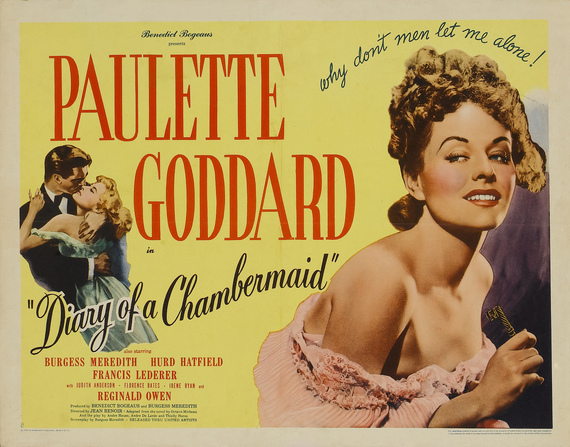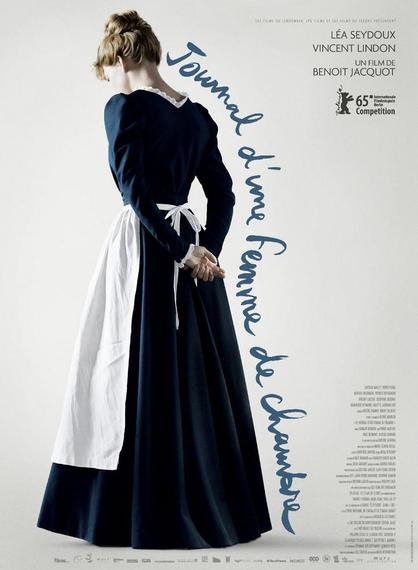Maids in Cinema
A view from the top of the stairs.
By Shari Kizirian
Maids usually get the shaft in the movies. Traditionally relegated to easy sexual pickins or another kind of pitiful victim, they have also been portrayed as one-dimensional comic relief or schemers slithering beneath the stairs, tucking silver into their aprons or slipping arsenic into the mistress's tea (think the garish Eastmancolor duo in Jean Genet's The Maids). Sometimes they get a bit of real power as domineering spinster nutcases (Mrs. Danvers) but often they are the self-sacrificing kind, even the stiff-upper-lipped Mrs. Wilson in Gosford Park (with its nuanced portrait of all the English hierarchies), who wields a soupçon of household poison against the master, does so to spare her estranged son. American cinema's most longsuffering maid is the Fanny Hurst-created character in Imitation of Life who loses her light-skinned daughter to racism. She is called Delilah in the John Stahl adaptation and Annie in Sirk's. Two scenes in these separate versions, despite all their period-trapped failings, manage to express some truth. Shot in a single, lingering tableau, Claudette Colbert, in the 1934 release, worried about her party and her boyfriend, goes up the staircase, while Louise Beavers, her rock, basically her wife (not to mention the source of all her wealth) whose daughter has just run away, walks down. In the Lana Turner-Juanita Moore film twenty-five years later, whites had advanced little, Sirk more than most. When Annie gives Miss Lora her extensive guest list for her funeral, Lora reacts in surprise that she has so many friends. "You never asked," comes the response, delivered matter of fact and rancor-free. Moore's Annie is the real protagonist and warm heart of the story, yet judging from the film's publicity, only a marginal character even as she garnered an Academy Award nomination for her portrayal. It is a rare maid in cinema given her due, never mind a life beyond the service area. Only one comes to mind: Emma Thompson's supporting character, Miss Kenton, who choses independence and happiness with a good man over true love and continued service in Remains of the Day. I suppose until a maid, nanny, housekeeper or cleaning lady makes her own film, we'll have to settle for a view from the top of the stairs. And while some still smack of classist and racist stereotypes, some manage to turn it upside down.
Diary of a Chambermaid
The French love Célestine, incarnated as the protagonist of three movies so far: by the upbeat Paulette Goddard in Jean Renoir's first screen version; by the inscrutable Jeanne Moreau in Buñuel's 1930s-era murder mystery; and, most recently, by the louche, luscious Léa Seydoux. Revolutionary in its day the 1900 book is written in a maid's voice, a way author Octave Mirbeau saw to critique upper-class French society, riven by anti-Semitism and anti-republicanism. Célestine stands apart from both her upper-class employers and her peers for expressing ambitions above her station (one of the rabble who aspires to live like a queen) but her primary value lies in her physical attributes. She gets away with subpar cleaning skills (where and how she cleans that first chamber pot will have you reaching for antibiotics), acerbic backtalk and scheming machinations precisely because she is easy on the eye and offers the promise of sex for the master, and relief for some of the wives. Even in Benoît Jacquot's fresh take, shot with a loose, documentary-style camera, playing with the timeline, making good use of the anecdotal quality of the source material, she shouldn't have to be a maid. The other maids, bound to the scullery or pretending at mistressdom, are more complete as characters (and Celestine's friends) in this version but rather merit their inferior lot. Still, it's fun to watch (and hear) Célestine spit colorful invectives at the clueless snobs and scary rightwing nutjobs alike, fools of their own kind to be pitied.
The Maid
Live-in nannies and maids are often the same person in Latin American homes; the title of Chilean film director Sebastian Silva's film La Nana translates to "nanny" in English and we meet Raquel just her charges are mostly grown leaving her to do just the cooking and cleaning. Her change in station has made her sour, devious, character traits Silva uses to play into employers' general unease with ceding such intimacy to outsiders. She's suffering a kind of empty nest syndrome and starts to become dangerous. She's not going to steal the silver or poison anyone, at least anyone who matters. Instead, she turns all her resentment on the second maid who comes to help out when she collapses from an unknown ailment. In the service area, behind that magical door that separates the kitchen from the rest of the house, she's in command, lording over any newcomer, locking them out, giving the tub a good disinfecting after they shower to make them feel like scum, hoping to drive them away. Director Silva uses a suspenseful narrative to show how this kind of isolation can breed a little crazy and a lot of sad. Like many of his middle- to upper-class compatriots Silva probably spent a lot of time himself as a charge and then later, in charge, and he ultimately gives us a funny, sympathetic portrait of Raquel. However, in this world, the maid's the one with the learning to do and you long for some of Célestine-style invectives to fly out of her mouth in another direction.
The Second Mother
Back in August, Anna Muylaert's The Second Mother (Que Horas Ela Volta?) opened stronger in Brazil than the latest edition of the U.S. franchise Mission Impossible, a rare occurrence for homegrown product, and the film is still playing on some screens, months later. Now the country's official Oscar contender, Muylaert's triumph is especially remarkable for its storyline, which contains the makings of a social revolution. Poorly educated, often teen-aged mothers and women of color, Brazil's army of live-ins go far and stay long, bonding in a way with their employer's family that they couldn't afford to do with their own. Regina Casé, a beloved TV personality in Brazil (and star of the internationally acclaimed Me You Them from 2000), is captivating as Val who for twenty years has been the cleaning lady, nanny and cook, a housekeeper without the wages and respect, cloistered in the service area of a big house with a pool in a leafy redoubt for the São Paulo elite, caring for a successful wife, her independently wealthy but unambitious husband, and their now-teenaged son. When Val's educated daughter comes to town to take college entrance exams, Val goes from joy to high anxiety as Jéssica mixes with Val's superiors like an equal, forcing unspoken household protocols to be said out loud.
The father (a meek, rather ridiculous sexual predator) offers Jéssica the guest room as a more comfortable place to sleep and study than the mother's hot cramped cell-sized room. She eats at the family table, helps herself to the "good" ice cream, generally taking the family at its word when they assure her to make herself at home. But they don't really mean it, as Casé, the mistress of the house, and the audience, who probably live some form of this reality at home, well know. When the daughter, warned not to dare go in the pool, ends up there anyway, the three women seated near me in the movie theater exploded into a spew of disapproving clucks for the daughter and sympathetic murmurs for Casé. What did those same women think when the lovable Casé ends up in the pool herself much later? I couldn't tell, they were lock-jaw silent. This is Muylaert's revolution: who is this audience rooting for now? That the director then indulges in a relative happy ending for her protagonist becomes a bit of forgivable pandering. All the actual and fictional maids out there deserve it, even if it has been rarely attainable in either realm.




